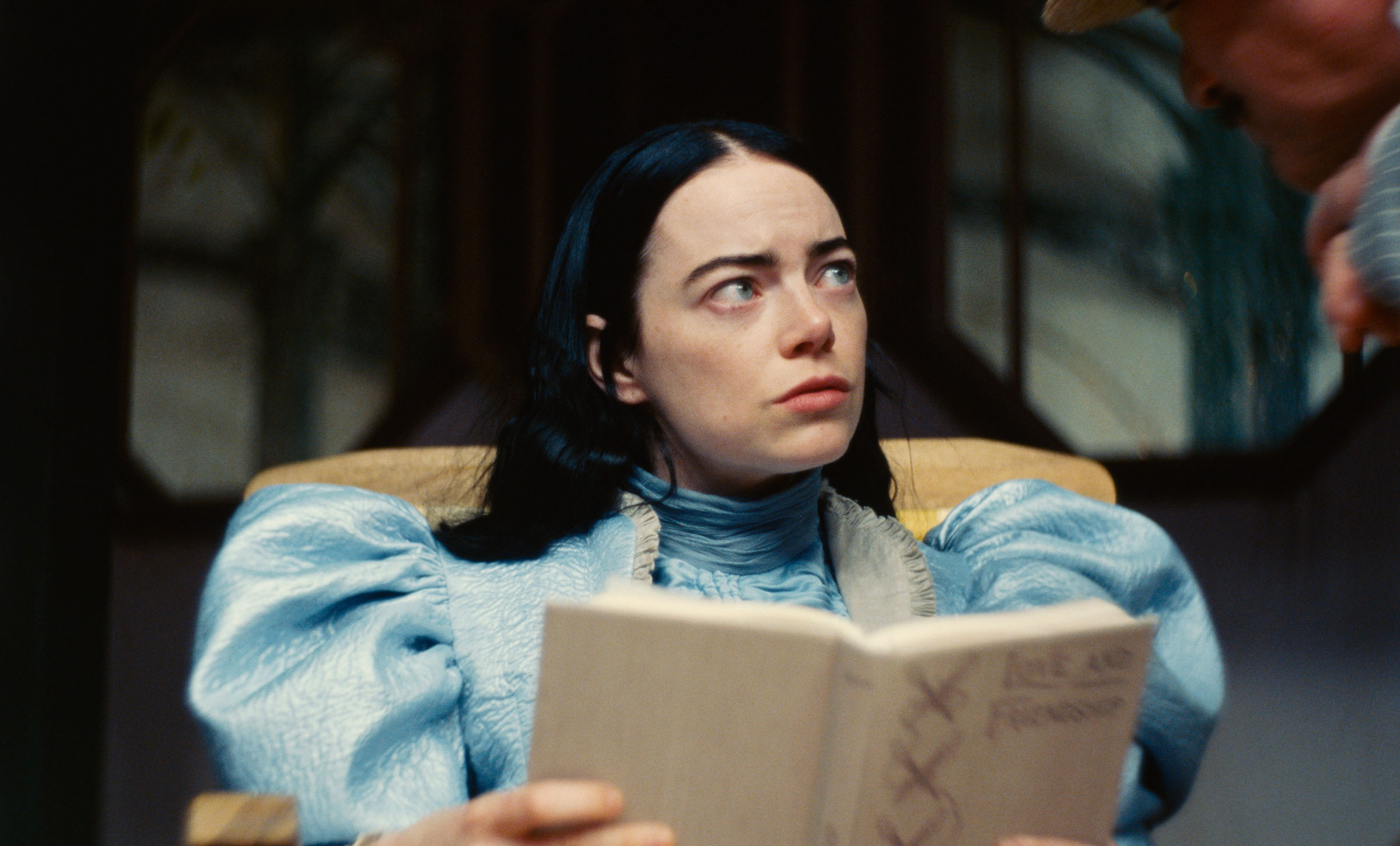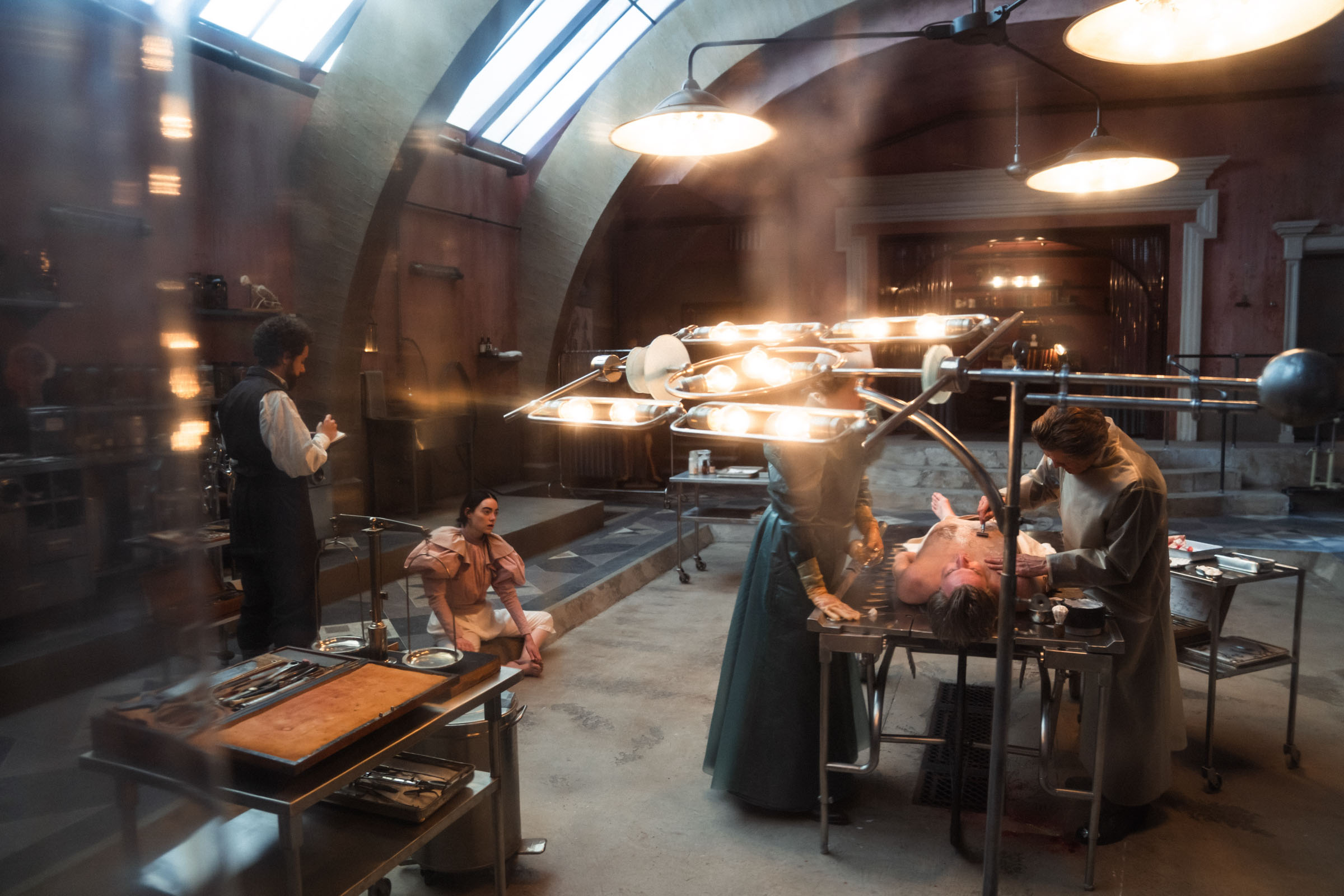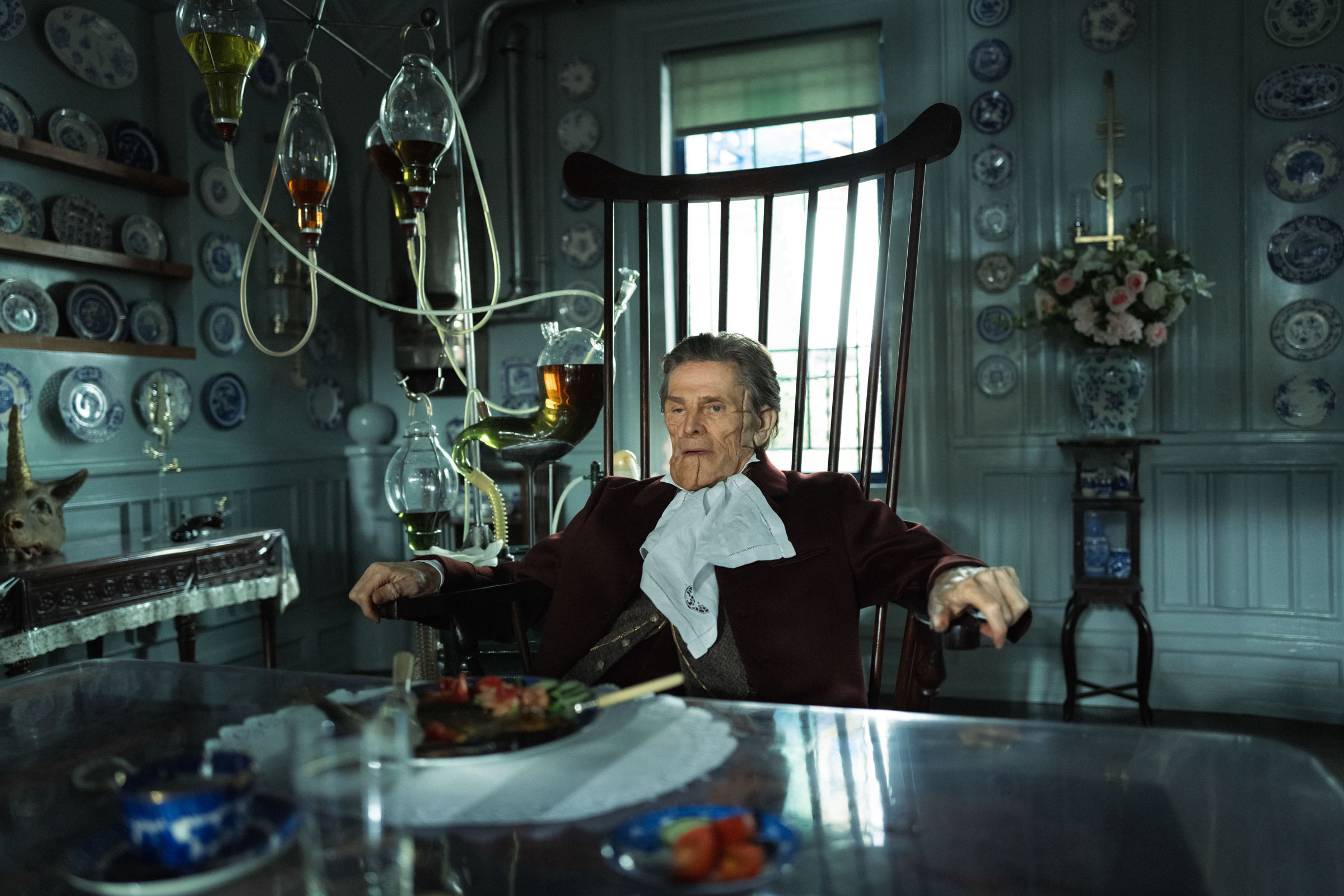
In Yorgos Lanthimos' new film Poor Things, Emma Stone stars as Bella Baxter, a curious Victorian creature with an unorthodox past. Though she appears as a full-grown adult, Bella is a child-woman, the product of an experiment in which her creator and father figure, Dr. Godwin Baxter (Willem Dafoe)—"God" for short—took her corpse and reanimated it, replacing her brain with that of the unborn fetus she was carrying at the time. This made her both her own mother and child, while not quite either. If this sounds like a twisted, gender-swapped retelling of Frankenstein, that's because its source material, Alasdair Gray's 1992 novel also called Poor Things, is a clever retelling of Mary Shelley's seminal work, with the winsome Bella replacing the feared creature.
Read more: Emma Stone Works Twisted Fairytale Magic in Poor Things
In Lanthimos' big-screen adaptation, Bella embodies a feminist fever dream. Her intellectual and sexual awakening spurs an international voyage that helps her fearlessly forge a path to her own future. It's a humorous but clear-eyed commentary on the ways in which women are often limited and controlled both systemically and interpersonally, a tension that Lanthimos had been fascinated by since he read Poor Things 12 years ago.

"Power is the story of a woman," he told TIME, noting that he and screenwriter Tony McNamara felt it was important in their adaptation to make the film about Bella and from her perspective, as opposed to the book, which tells her story through other characters. "Bella goes through her life without shame, discovering what she feels she needs intuitively, which is heroic in a world where you're constantly told how to be or what's right. It is an act of bravery to make your own path."
While Lanthimos and McNamara told TIME that their modern adaptation wasn't heavily inspired by Frankenstein beyond that book's influence on Gray's novel, it's clear that Poor Things owes much to both Shelley and Frankenstein. For Anne K. Mellor, professor of English and women's studies at UCLA and the author of Mary Shelley: Her Life, Her Fiction, Her Monsters, both Bella's origin story and her essence follow in Shelley's complex feminist legacy.
"Frankenstein is essentially about power and how it leads us astray," Mellor told TIME. "Victor Frankenstein is trying to take over the ability create life itself, from Mother Nature and from women. What results is a model of what happens when a woman is erased, which is what patriarchy, in effect, tries to do."
Read more: The Real Science That Created Frankenstein's Monster
The Frankenstein references in Poor Things track back to some of the most formative moments in Shelley's life, events that indelibly shaped her feminist sensibility. Dr. Godwin Baxter is named, in a Freudian nod, for Shelley's writer and anarchist philosopher father, William Godwin, who served as the partial inspiration for Victor Frankenstein. Shelley had a complicated and intense relationship with her father, who was her primary caretaker after her mother died giving birth to her. Like Dr. Baxter, Godwin was responsible for Shelley's education, nurturing her intellectually. Their close bond was altered after he remarried and later sent her to live in Scotland, choices she viewed as acts of abandonment; when she later ran away and married the poet Percy Bysshe Shelley, Godwin disowned her, adding to Shelley's feeling of rejection from her father. Their relationship is reflected in both the creature's obsessive longing for his creator, and in Frankenstein's rejection of him in the novel.
For McNamara, the central questions that surround Victor Frankenstein also remained important as he thought about the character of Dr. Baxter.
"Why does he need to create someone? What was driving him to do it and what does he get out of it? When you think about what his relationship to her was, as a daughter and as an experiment, it informed a lot of his character and what his evolution with her relationship would be."

Meanwhile, Bella's world tour in the film parallels the travels of both Shelley and her mother, writer and noted women's rights advocate Mary Wollstonecraft, who wrote A Vindication of the Rights of Women, and who, like Bella, also struck out on her own at a young age. Bella's sexual liberation can be read as a reference to both Shelley and Wollstonecraft's unconventional sexual relationships outside of marriage or the free love values of Shelley's husband, Percy Bysshe Shelley. And Bella's intellectual awakening, which leads to her embrace of socialism, is a reflection of the class struggle inherent in Frankenstein, a theme that was inspired by Shelley's tour of France in the wake of the French Revolution, where she bore witness to poverty and suffering.
However, the most outsize example of Shelley's feminist influence in Poor Things may lie within the parallels between Bella and Safie, a minor character in Frankenstein, who was inspired by Wollstonecraft. In Shelley's novel, Safie is a Christian woman fleeing patriarchal oppression in Turkey. She's engaged to Felix De Lacey, whose family is unwittingly housing the creature. Through Safie, the creature gets an education; as she learns French and the history and politics of Europe, so does he. Her journey as well as her desire to learn are reflected in Bella's own odyssey and her coming of age.
Read more: Did a Real-Life Alchemist Inspire Frankenstein?
"Here's a woman, free, wandering from Europe on her own independence," Mellor said of the similarities between Wollstonecraft, Safie, and Bella. "Seeking love but also seeking knowledge."
While Frankenstein is an undeniably feminist text, just as Shelley is an undeniably feminist writer, Mellor notes that Shelley was no crusader for the cause. Her mother's work was foundational to the burgeoning women's rights movement, but Shelley did not join it during her lifetime. In many respects, though, the life she led and the work she produced was a reflection of its values.
"Mary Shelley had a complicated relationship to feminism," Mellor said. "She made a living supporting herself and her son by writing, which was not common, especially for a single woman."

Mellor points to Shelley's simultaneous admiration of and resentment for the famous mother she never knew—as well as her complex relationship with her father, whose approval and affection she hungered for throughout her life—as part of why Shelley may have been wary of the women's rights movement. She also considers Shelley's tumultuous marriage with Percy, which was strained by multiple miscarriages and Percy's many affairs, including one with her stepsister, an influential factor in Shelley's disillusionment with feminism. According to Mellor, even after Percy's death, Shelley's life was still affected by her late husband; their son inherited his title and along with it, the social mores expected of nobility. As Shelley fought for her son's inheritance, she was hyperaware of the respectability politics that would affect his acceptance into the aristocracy, which largely restricted her ability to overtly challenge gender or class conventions.
Read more: The Eerie Gravestone Where Frankenstein's Story Began
However, these nuances paint a richer and more complex portrait of a woman who, like Bella Baxter, unapologetically lived life on her own terms. For Mellor, Shelley's pessimistic longing for a liberated and equitable future are seen with the characters of Safie and Felix, whose names mean wisdom and happiness, respectively. Their relationship, in which they view each other as equals and mutually care for and respect one another, presents an ideal to aspire to. But hopes for a bright future are dashed when the creature sets fire to their cottage as retribution for their fearful response to him.
"There's an unrealized possibility in the novel for the future," Mellor said. "It just wasn't one that Mary Shelley at this point in her life could actually embrace."
For Lanthimos, Shelley's Frankenstein represents a launchpad for Bella's story, one that ultimately has the liberating ending Shelley may have longed for.
"It's the foundation to build and explore this very different story of this woman that goes out into the world and experiences it on her own terms."
More Must-Reads From TIME
- The 100 Most Influential People of 2024
- Coco Gauff Is Playing for Herself Now
- Scenes From Pro-Palestinian Encampments Across U.S. Universities
- 6 Compliments That Land Every Time
- If You're Dating Right Now , You're Brave: Column
- The AI That Could Heal a Divided Internet
- Fallout Is a Brilliant Model for the Future of Video Game Adaptations
- Want Weekly Recs on What to Watch, Read, and More? Sign Up for Worth Your Time
Write to Cady Lang at cady.lang@timemagazine.com